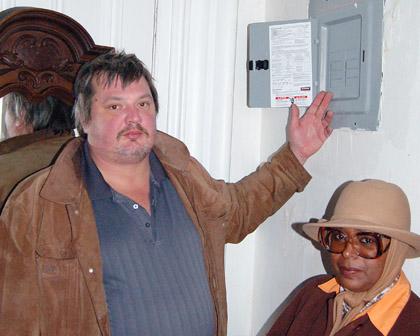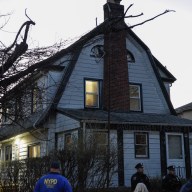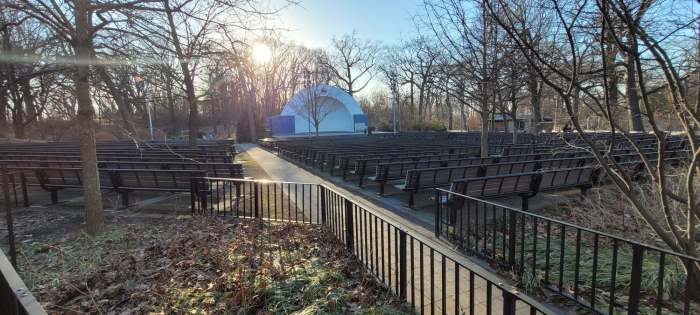By Stephen Stirling
“A week prior to July 9, that’s when the nightmare began.”
Standing in the hallway of the College Point building she calls home, tears streamed down the face of Edna Rodriguez as she recounted the last five months of her life.
“It started when the lights started flickering on and off. Then we spent a week with no electricity,” Rodriguez said, her 12−year−old son at her side. “Then all of a sudden, on July 9, I was at work and I got a call from my husband saying you’ve gotta get home. We’ve got to grab what we can, we’re being vacated.”
Like about a dozen other residents who occupy seven apartments at 11−41 123rd St., Rodriguez; her husband, Steven Gonzalez; and her two sons, Joshua, 12, and Steven, 7, were forced to leave their home in July after the city Department of Buildings deemed the electrical wiring in their building dangerous.
“It’s been more than five months now. You go here for a few days. You stay there for a while. I wake up in the morning wishing it was a bad dream. I go to sleep at night praying I’ll get to go home,” she said. “How is this any way for my children to live? Where am I going to put my Christmas tree? Where am I going to cook my Thanksgiving turkey? I want to come home. It’s not fair.”
Outwardly, 11−41 123rd Street — known as Schleicher’s Court — seems like an ideal place to live. Built sometime in the 1850s, the three−story Victorian home stands out on the block — a red brick behemoth with high ceilings separated into seven spacious apartments and a large yard outside.
But a quick check of DOB records shows the 19th century relic is plagued by problems.
The house currently has 17 open DOB and Environmental Control Board violations dating back to 1997, involving everything from boiler issues to illegal construction. The building’s woes culminated on July 9, when a DOB inspector came to investigate a complaint of an illegal conversion in the basement and discovered the house’s electrical wiring was in shambles.
The DOB placed a full vacate order on the property the next day until the building’s owner, Eva Rohan, fixed the problems. More than five months later, Rodriguez and her fellow tenants still have not been able to return to their homes.
Four of the seven tenants said they have been staying with relatives in various parts of Queens, two remain in shelters and one tenant cut ties with Rohan entirely, opting instead to search for permanent housing elsewhere.
“I’ve been living in a shelter in the Bronx with my daughter,” said Ana Victoria Reynoso, who is three−months pregnant. “It’s depressing every day. She is always telling me, ‘Mom I want to go to the Queens house.’ And I have to keep explaining to her we can’t, we can’t go back there yet. It’s almost six months now.”
“I’m in my father’s little studio,” said another tenant, Esperanza Douglas, who rents most of the first floor. “My son’s been sleeping on the floor. I lost my job because of this. I’m an X−ray technician with Local 32BJ. I kept having to take time off. I couldn’t do it anymore. Eventually they let me sign a letter of resignation. I shouldn’t have to live like this.”
The tenants contend that Rohan and her sister, Georgina, who acts as the building’s manager, have neglected to fix the archaic electrical system in the building for more than a decade despite numerous violations — and thousands of dollars in unpaid fines — from the DOB.
Calls to both Rohan and her sister for comment were not returned.
“All she wants to do is put Band−Aids on things and call it fixed,” Rodriguez said.
As a result of the vacate order, some of the tenants have contacted the city to get stop−payments on their rents, which range from just over $1,000 to more than $2,300 per month. In a phone message left for Rodriguez, a woman who identified herself as Eva Rohan accused the tenant of not paying her Con Edison bill and argued this was the reason the electrical work had not been completed.
“What to you want me do? What more do you want me to do?” the woman said. “Maybe if you pay your bills some work can get done.”
Rodriguez said she cleared her balance with Con Edison several weeks ago. A turn−off of service noticed delivered to the address, dated Oct. 2, said Rohan owed $5,413.27 in outstanding electric bills at 11−41 123rd St.
Tommy Haimeck, a contractor said he briefly worked with Rohan to attempt to fix some of the electrical problems in the building, said while a prickly relationship between the tenants and the owner complicated repairs, ultimately he never got the impression that she was serious about completing them.
“Eva does one thing and says another,” said Haimeck, who lives down the street. “Maybe she could have gotten away with some of these things 40 years ago, but not now. She just doesn’t want to spend the money.”
A tour of some of the residents’ apartments revealed newly installed fuse boxes, with no fuses or wiring attached.
“A lot of us come back every few days to get clothes,” said Kalvis Macs, a resident on the third floor, who has been staying at a YMCA in Jamaica. “She put these in to make it like she’s doing something, but there’s nothing in them. They’re just metal boxes.”
City Councilman Tony Avella (D−Bayside) was expected to meet with the residents and representatives from the DOB and the city Department of Housing Preservation and Development this week in the hopes of pushing the city to make emergency repairs to the building that would allow the residents to return.
“It’s clear that the owner is just not being responsive,” Avella said. “The landlord is pretty much just a creep. She should have been making these repairs all along.”
Even if the city does not make the repairs, Douglas’ husband, Cleveland Ruff, said he has no intentions of giving up the fight for his home anytime soon.
“You know what she says? ‘If you don’t like it, then just move,’ ” Ruff said. “I love my home. I’m not leaving. That witch, she’s not going to get us out of here.”
Reach reporter Stephen Stirling by e−mail at sstirling@timesledger.com or by phone at 718−229−0300, Ext. 138.

































